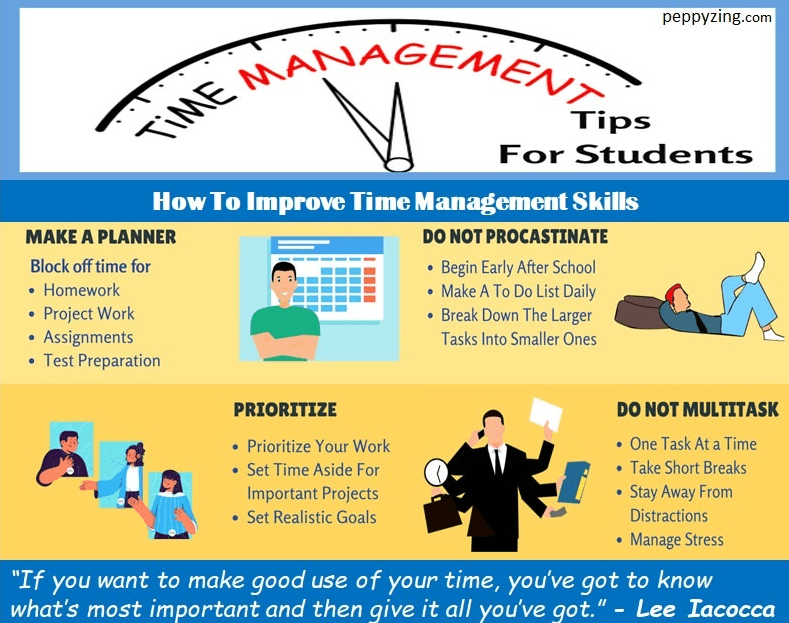
“If you want to make good use of your time, you’ve got to know what’s most important and then give it all you’ve got.” – Lee Iacocca
Do you find your child overwhelmed with the tasks to be finished in the few hours left after school? For school-going children, juggling between homework, the other tasks like hobby class, project work, play, and routine activities is a bit too much. On top of it, if exams are approaching, time management for students becomes even more essential.
Not only for the kids, it is overwhelming for you as parents as well, when you see your child struggling between different tasks. This, in turn, makes you push your child to hurry up, making things even more complicated for them.
What is Time Management
Effective time management for students is about taking control of the time you have and making it purposeful. It’s about optimizing your time for productivity and focus effectively.
Most children do not have developed cognitive skills during early school-going days to organize their schedules independently. And this makes it a challenging task for most students to utilize time efficiently.
Homework and extracurriculars increase as they progress to higher classes, and it becomes even more important that kids learn to set goals, prioritize, organize, and think flexibly.
Importance Of Time Management For Students
Effective time management for students is crucial for completing their studies and related activities efficiently, and turning their day productive.
Teaching your children the strategies of time management from an early age, will help them inculcate it in their routine, setting them for life-long success.
As parents, you can start teaching them how to plan and prioritize their important tasks, so that they maximize their available time.
Share this Image On Your Site
How To Improve Time Management Skills
Wondering how to begin? No worries. Let’s start by observing your child’s daily activities as to what activities they are involved in and how much time they take to complete those tasks.
Another valuable source of feedback is through Parent-Teacher Meeting. Regular interaction with your child’s teacher can help you get some understanding of the essential concepts and lessons they teach, so that you can make the school year’s schedule more manageable and help your child prioritize their work for the long term too.
Here are some tips on time management for students that will help your child manage time effectively.
1. Let The Child Prepare Their Planner

Let’s start with the simple activity — by helping your child prepare their calendar-planner that’ll list the dates, and a schedule of activities to be completed each day. Prepare a planner that is easy to understand for your child by using different colors for each subject.
With a master schedule, your child can block off time to work on their homework and other activities, like textbook reading or mathematics, to be practiced daily.
This will help students prioritize their work according to the due dates provided by the school.
With their planner – calendar, your child will understand the importance of days and timelines better. The sooner your kids learn to prepare and follow their schedule, the sooner and more independent they will become. Know more about various tools of time management.
“A plan is what, a schedule is when. It takes both a plan and a schedule to get things done.” – Peter Turla
2. Set Priorities
It is essential that students learn to differentiate between ‘have to dos’ and ‘want to dos’ and learn to prioritize their work accordingly.
The master schedule or the planner calendar will help your child to set some specific goals each day, like which particular chapter to be read in an English subject today, or how many mathematical sums to be solved from a particular chapter, and so on.
This will not only maintain a regular flow or rhythm for study but will also ensure the assignments are complete on time.
3. Set Time Aside For Important Projects
- Sit down with your child on the weekends to review the upcoming exams or the dates by which the assignments are to be submitted.
- Add these to your child’s planner or agenda.
- Set aside some time for important projects and let your child start working on them well before they are due.
- This will help your child learn better time management and be stress-free as they will be well-prepared, ahead of their upcoming exams.
4. Set Realistic Goals For Each Study Session

Students sometimes overestimate what they can accomplish each day. They include too many activities for a day in their daily planner, that it might not be realistic to achieve in one single day. Consequently, unable to manage to complete everything as intended, leaves them discouraged and demotivated to study.
To prepare a realistic schedule,
- your child needs to have a clear sense of how long it takes to complete a certain task or homework.
- Depending on the time it requires and taking into consideration a few unforeseen interruptions, help your child make a practically applicable daily plan or schedule of activities.
It may not be possible to follow a schedule to a minute. But your child will be far more productive by using the schedule for keeping a track of work to be done, rather than not using it at all.
5. Begin Early After The School
Make it a point to have a look over your child’s master schedule as well as their school diary daily. Find out what homework or assignments need to be completed and if there are any other assignments to be submitted the following day.
Encourage your child to start working on their homework right after school so that no work is left unfinished. This will help them to keep their work up to date on a daily basis.
Waiting for them to start until evening will leave them with less time and energy, delayed bedtime, unfinished assignments, and stress to you as well as to your child.
6. Leave No Scope For Procrastination
Generally, students tend to procrastinate, when the task seems so daunting that they lack the motivation to accomplish, and resultantly, postpone it for a future date.
Similarly, if the assignments are larger and time taking one, it is likely for your child to procrastinate it.
The vicious cycle continues until the last moment when it is urgently required to be completed. And consequently, completing the assignments haphazardly, could lead to deteriorate the quality of their work and impact their grades.
To avoid procrastination, try this:
- Keep a track of all your immediate tasks and the ones which have a due date later.
- Create a calendar or schedule with all the deadlines and due dates for submission of homework, assignments, or projects so that you can see the big picture.
- Now make your daily To-Do List with the help of this calendar.
- Break down the larger tasks into smaller ones that can be quickly achieved.
- For example, if your child needs to submit their Science Project in the following week, help your child allocate some time aside for the science project each day.
- Before they know it, they will be ready with the project, way before the date of submission, without straining themselves at the last moment.
7. Work On One Task At A Time. Do Not Multi-Task.

“The shorter way to do many things is to only do one thing at a time.” – Mozart
It might appear being tactful and accomplished by multitasking, but it is the other way round. Splitting your attention to more than one task at a time will divert your focus and deteriorate the quality of your work.
- Your child should zero in on a specific task at hand which is most important, and focus on that particular task, giving their complete attention.
- Be it completing their homework, reading a textbook, practicing mathematics, or preparing for the next day test, they should pay attention to the task, which is at the topmost priority on their list.
- This will make learning more effective.
8. Take Short Breaks
Working or focusing on one particular topic for too long is likely to cause students’ minds to lose concentration and wander more. Tiny breaks between the tasks is a good way to give your child some time to get recharged and come back focused.
Depending upon your child’s attention span, decide a break time for them, and allow them to relax. For example, for every 45 minutes of school work, let your child take a short break of 10-15 minutes to recharge.
Do this will keep him focused till the completion of work, thus helping them to manage their time efficiently and productively.
9. Stay Away From Distractions
In this digitally dominant world, students are likely to be highly distracted and may get diverted from their everyday goals.
Students engaged over social media platforms, watching videos, and gaming over different devices can result in huge wastage of time and eat up most of the time which otherwise could have been used for completing the important academics tasks.
Educate your child, the value of time, and to utilize it fruitfully. During the time scheduled for schoolwork, tell them to keep away their devices and switch off the social media notifications.
10. Help Your Child Manage Stress
With so many activities and tasks to perform throughout the day and that too within a stipulated timeline, your child is likely to be under stress. The excessive pressure or stress of study can mar the student’s performance and productivity.
Your child needs healthy ways to manage stress while maintaining productivity. You can do so by:
- Setting some fixed time aside for entertainment, play and fun activities.
- Encouraging your child for exercising, cycling, swimming, or any other outdoor as well as indoor games, are some great ways to keep stress at bay.
- Allowing 10 minutes break for every 45 minutes of study. Let your child relax and have some water and snacks during the break.
- Getting sufficient sleep will allow your child to become stress-free and ready for the next day.
- Consequently, this will also increase concentration and focus, making learning more effective and efficient.
11. A Good Night Sleep Is Essential
After all days’ work, your child needs sufficient sleep to restore their energy and wake up fresh and energized the next morning. Getting enough sleep is important to help your child stay active and on track the next day.
- Set up a bedtime routine for your child and a plug-off time for each night. Following this routine will help your child, prioritize their work, and finish it accordingly, before bedtime.
- Insufficient sleep reduces the productivity of the students.
- Ensure that they get at least seven to eight hours of sleep daily to be recharged and have the energy to be equally productive each day.
12. Be A Mentor To Your Child
Do not impose the time management schedule on your child.
Educate them and help them understand how better time management can help them be more productive and efficient in their endeavors.
As a mentor, provide guidance and support to your kids and empower them to make choices – good or bad – for themselves.
I believe these time management tips and strategies helped your children maximize their time utilization.
Krishna is a Management graduate in Human Resource. She is an avid reader, knowledge seeker, and an adoring mother of two lovely kids.
